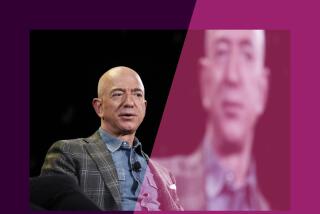Russia’s Bumper Crop of Nouveau Riche
- Share via
MOSCOW — The billionaires include an imprisoned oil magnate, a university professor, a man described as the country’s most eligible bachelor and the wife of Moscow’s mayor.
Casting a spotlight on the murky world of this country’s super-rich, the newly launched Russian edition of Forbes magazine Thursday published a list of Russia’s 100 richest businesspeople, including 36 billionaires -- a ninefold increase since 1997, when, it says, the first four Russians made it into the exclusive club.
About two-thirds of those listed became rich from the post-Soviet privatization of state assets in the 1990s, but high oil prices and a soaring stock market played a key role in their rapid increase of wealth, said Paul Khlebnikov, chief editor of the magazine’s Russian edition. The 36 billionaires control $110 billion, equal to about one-quarter of Russia’s annual economic output, he said at a Moscow news conference.
“Everybody knows that part of this wealth was made not in the most honest of ways,” but Russia’s rich are still “part of this society,” said Maxim Kashulinsky, the magazine’s projects editor. “These are not some kind of extraterrestrials who have landed in the territory of the country.... The list that we put together is an attempt to turn Russian business into something more transparent for the public.”
When Forbes published a list of the world’s richest people in February, it counted 25 Russian billionaires. But the Russian stock market rose 21% from Feb. 1 to April 15, and the all-Russia list reflects that leap.
The list was headed by oil magnate Mikhail Khodorkovsky, who the magazine says is worth $15.2 billion even as he sits in a Moscow prison awaiting trial on fraud and tax evasion charges. Supporters of Khodorkovsky, the former head of Yukos Oil Co., say his prosecution is politically motivated.
Among the most politically sensitive names on the list is Yelena Baturina, Russia’s richest woman and the wife of Moscow Mayor Yuri M. Luzhkov. She was estimated to hold $1.1 billion in assets.
Luzhkov has declared an annual income that “hardly exceeds $300,000 -- nothing to speak of for the mayor of a city with a multimillion population,” Forbes reported.
Baturina owns one of Moscow’s biggest construction firms, hotels in the Black Sea resort of Sochi, a large tract of farmland and a condensed-milk plant, as well as stock in three cement production plants, the magazine said.
Baturina “was somebody on a small scale in the plastic industry” when she married Luzhkov and soon won a tender for renovation of seats in the country’s biggest sports stadium, according to Andrei Piontkovsky, director of the Center for Strategic Studies, a Moscow think tank.
Vladimir Lisin, worth $4.8 billion, is one of the few Russian billionaires who still works in the field he studied in college. Forbes reported. Board chairman of the Novolipetsk steelmaker, he is also an economics professor at the Russian government’s Academy of National Economy. “Vladimir Lisin is probably the richest university professor in the world,” the magazine said.
The average profile of those on the top-100 list is a 47-year-old man born outside Moscow who received a higher education in a technical field in the capital, had good connections in political and business circles by 1998 and is now worth $1.3 billion, Kirill Vishnepolsky, the magazine’s deputy projects editor, said at the news conference.
This typical tycoon traded in computers, then other commodities, and was involved in arranging loans in return for shares in state assets that were being privatized, Vishnepolsky said. “He’s married a second time, has two children and spends a lot of time outside Russia.”
The magazine described Mikhail Prokhorov, 39, as the best prospective catch for a woman looking for a rich husband. Chief executive and 29% owner of Russian metals giant Norilsk Nickel, Prokhorov is worth $5.4 billion, it said.
“He remains the most lucrative bridegroom of Russia,” he said. During the last three years of Prokhorov’s leadership of Norilsk Nickel, it added, “the capitalization of the company rose fourfold, which only enhanced the masculine eligibility of the metal worker.”
Times staff writer Sergei L. Loiko contributed to this report.
More to Read
Sign up for Essential California
The most important California stories and recommendations in your inbox every morning.
You may occasionally receive promotional content from the Los Angeles Times.













